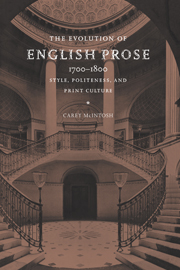Book contents
- Frontmatter
- Contents
- Preface
- 1 The ordering of English
- 2 Literacy and politeness: the gentrification of English prose
- 3 Testing the model
- 4 Loose and periodic sentences
- 5 Lofty language and low
- 6 Nominal and oral styles: Johnson and Richardson
- 7 The New Rhetoric of 1748 to 1793
- 8 The instruments of literacy
- 9 Politeness; feminization
- 10 Style and rhetoric
- Epilogue: language change
- References
- Index
9 - Politeness; feminization
Published online by Cambridge University Press: 18 December 2009
- Frontmatter
- Contents
- Preface
- 1 The ordering of English
- 2 Literacy and politeness: the gentrification of English prose
- 3 Testing the model
- 4 Loose and periodic sentences
- 5 Lofty language and low
- 6 Nominal and oral styles: Johnson and Richardson
- 7 The New Rhetoric of 1748 to 1793
- 8 The instruments of literacy
- 9 Politeness; feminization
- 10 Style and rhetoric
- Epilogue: language change
- References
- Index
Summary
From the ease of the language, the vivacity of spirit, the delicacy of sentiment, and the abundance of love and tenderness which we find in this novel, we hesitate not to pronounce, that a Lady wrote it.
(Monthly Review, 1766)In this chapter I collect a number of topics related to the growth of politeness in the eighteenth century, chief among them the new cultural vitality of women. Politeness in the largest sense is a universal: all societies, no matter how small or undeveloped, will fall apart without cooperation, based on a collective agreement on how to handle status (power); this agreement is codified in the rules and rituals of politeness. But women are politer than men – or so the eighteenth century believed, and the rise of the polite lady as an almost archetypal figure in novels, in the drama, in letters and memoirs and essays of the middle decades of the eighteenth century was, in Johnson's phrase, a “powerful fact.” Another sense of the term politeness is associated with civilizedness and high culture and luxury. Paul Langford reminds us in the introduction of his very useful history of England 1727–1783 that luxury was a central preoccupation of these years, Wealth of Nations the most influential book of the period, and politeness “a logical consequence of commerce” – even though the great majority of people had few luxuries, virtually zero political power, and not much opportunity to exercise politeness (1989: 3–4). If “all property” depended on “the chastity of women,” as many people believed, then any account of “a polite and commercial people,” as Blackstone called them, must reckon with changes in the position of women during the period.
- Type
- Chapter
- Information
- The Evolution of English Prose, 1700–1800Style, Politeness, and Print Culture, pp. 195 - 220Publisher: Cambridge University PressPrint publication year: 1998



